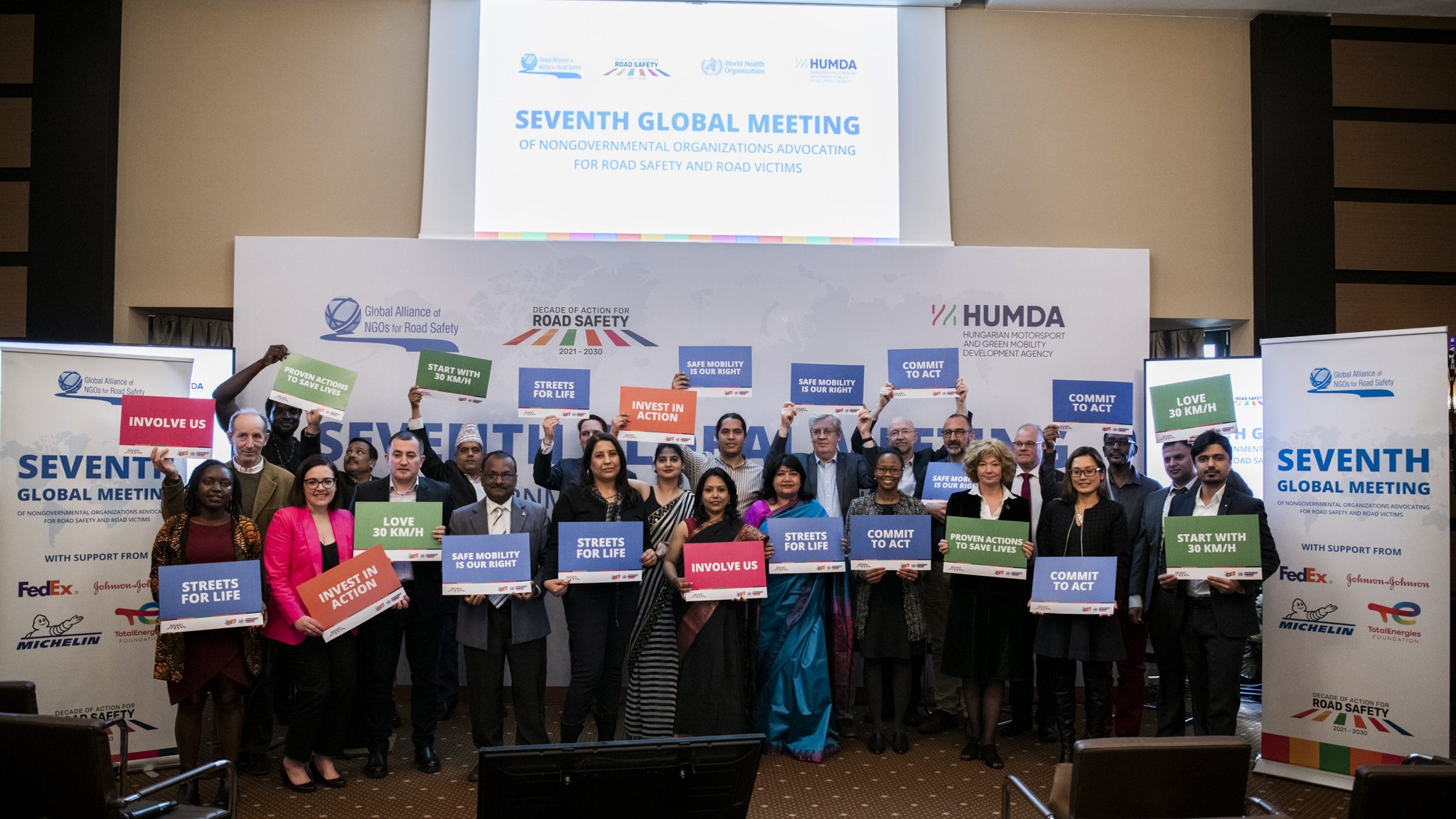
25 March 2022, Budapest, Hungary
Road safety NGOs have set out a call to action for governments in their countries: commit to act for people’s right to safe mobility and a 50% reduction in road deaths and injuries by 2030.
The call to action, defined by members of the Global Alliance of NGOs for Road Safety and described in the Alliance’s Budapest NGO Declaration, was presented at the Seventh Global Meeting of Nongovernmental Organizations Advocating for Road Safety and Road Victims (Global Meeting) today, in Budapest, Hungary, and online.
The Declaration will support NGOs’ efforts to mobilize their decision makers to commit to road safety actions that will save lives. With an important High-level Meeting on Road Safety to be hosted by the UN General Assembly in June 2022, decision makers have an opportunity to show what they will do to achieve a 50% reduction in road deaths and injuries by 2030. The time to act is now.
During the Global Meeting, which was opened by Professor Dr. László Palkovics, Minister for Innovation and Technology, the Declaration was received and welcomed on behalf of the European Commission by Mr. Matthew Baldwin, Deputy Director-General, Directorate-General for Mobility and Transport. It will now be used by the Alliance’s 295 members in 99 countries to build support for meaningful road safety action and investment among governments around the world.
The Declaration has been praised by global leaders speaking at the Global Meeting, including Mr. Abdulla Shahid, President of the 76th session of the UN General Assembly; Mr. Jean Todt, UN Secretary General’s Special Envoy for Road Safety; and Dr. Etienne Krug, Director, Social Determinants of Health, WHO.
Mr. Abdulla Shahid, President of the 76th session of the UN General Assembly, said, “Involving civil society in the development and delivery of road safety is a matter of justice and inclusiveness; it is essential for effective and sustainable casualty reduction. It is a smart use of local road safety resources. NGOs have the capacity to effectively channel necessary resources to the right place and the right people; change mindsets on road safety; invigorate stagnant bureaucracies; provide support to countries in vulnerable situations; and inspire governments, enterprises and individuals to take meaningful, collaborative action.”
Mr. Jean Todt, the UN Secretary-General’s Special Envoy for Road Safety, said, “This NGO Declaration is a basis for clear action to achieve the Decade of Action. Much progress in road safety is thanks to passionate and effective NGOs and I look forward to working together with Alliance members to advocate with their governments to enhance and accelerate smart road safety action, built around the needs of people and the environment.”
Dr. Etienne Krug, Director, Social Determinants of Health, WHO, said, “We need to continue our efforts to ensure high-level leadership to tackle road safety. We applaud the NGOs’ Budapest Declaration. It is another important step forward and will raise attention to some of the most critical issues that must be addressed to achieve a 50% reduction in road traffic deaths and injuries by 2030.”
The Declaration has been converted into specific, regional calls to action, defined by Alliance member NGOs and tackling particular challenges faced in each region. See each of the regional calls to action here:
The Global Meeting was organized by the Alliance, hosted by the World Health Organization and the Hungarian Motorsport and Green Mobility Agency, which is the national road safety agency, with sponsorship from FedEx Corp., Michelin, Total Energies Foundation, and other sponsors.
Lotte Brondum, Executive Director, the Alliance, said, “With only 3,203 days left until the end of the Decade of Action, our governments must act now. We know what works to save lives, it is time to implement it. We, as NGOs, commit to playing our part in the Decade of Action, standing up for people’s rights to be safe on the road. We call on our decision makers to implement evidence-based actions, starting with 30 km/h limits where people walk, live, and play, invest in road safety, and involve NGOs in road safety decision making. This is how we will achieve the 2030 target and guarantee people’s right to safe mobility.”